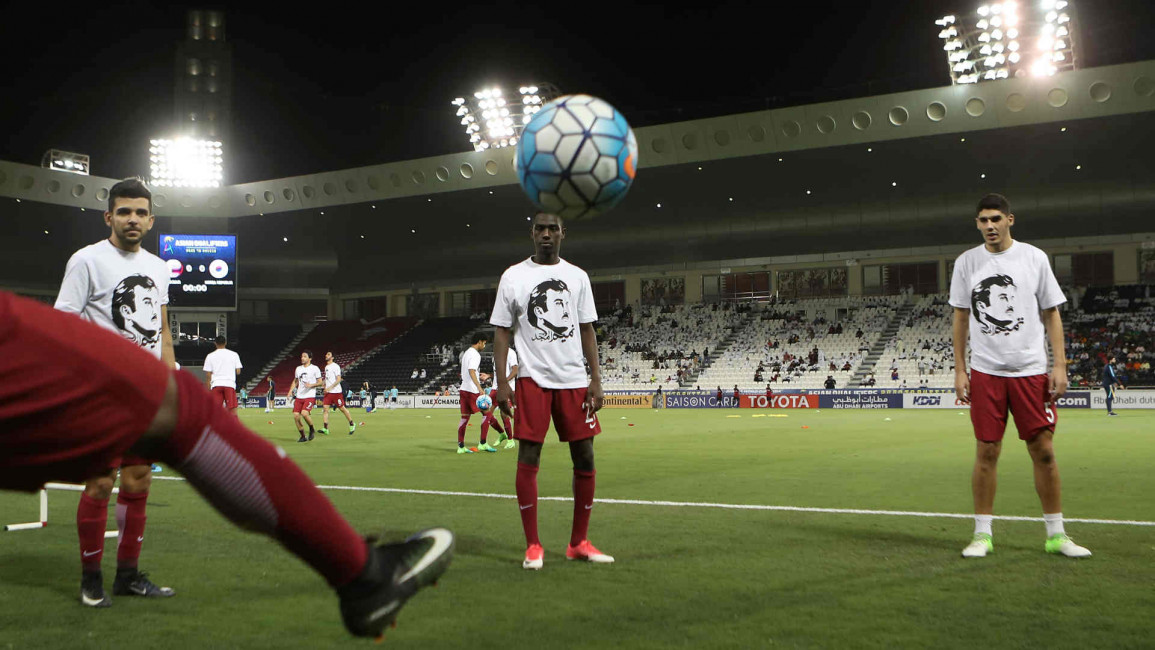
Could the beautiful game resolve the Gulf diplomatic crisis?
Could the beautiful game resolve the Gulf diplomatic crisis?
Comment: As the Gulf Cup kicks off in Kuwait, fans are hoping for a renewed fraternal spirit to emerge in the region, writes Anthony Harwood.
5 min read
Qatar footballers show their support for Emir Tamim al-Thani at a previous match [AFP]
Of all the potential football matches at the Gulf Cup - which kicks off today - there are a couple which catch the eye for more than just sporting reasons.
Financially, two of the most mismatched teams in history could meet in the knockout stage. But it's not just the amount of money that Saudi Arabia and Yemen can spend on their players that's interesting - the Yemeni side do not even have a grass pitch on which to practice.
There's also the fact that Saudi planes have spent nearly three years bombing Yemen back to the Dark Ages, and how that might play out in any fixture.
An equally interesting prospect is a match between Qatar and Saudi Arabia - or any of the blockading countries for that matter. For instance, we know that Qatar will meet Bahrain in the group stage next Friday.
It was at the same tournament three years ago that Riyadh and Doha managed to patch things up after their previous diplomatic bust-up.
But this time there is no indication of a repeat rapprochement.
Six months ago, a Saudi-led alliance, including the United Arab Emirates, Bahrain and Egypt, launched a diplomatic and transport blockade of Qatar, accusing it of cosying up to Iran and supporting terrorism, charges which Doha vehemently deny.
And judging by some of their players' behaviour yesterday, the quartet is in no mood for the same friendliness as was shown in 2014.
At an eve-of-tournament press conference, the Saudi and UAE teams both stormed out when their request for a Qatari TV channel's microphone to be removed was turned down.
Saudi Arabia and its sidekick, the UAE, have also sent weakened teams in an attempt to damage the tournament.
It's a bit like when then-holders Manchester United pulled out the 1999-2000 FA Cup to play in a tournament in South America, which damaged that 100-year-old competition.
I know the Gulf Cup has only been going 23 years, but, like the Gulf Co-operation Council itself, it's still something worth having because it brings countries together.
It also brings hope - that it might be used as springboard for peace.
As @5arj_alsrbq, a Saudi soccer fan, said: "FACT! The 2014 Gulf Crisis between the blockading countries and Qatar was resolved before the Gulf Cup #optimism."
Even if the leaders of the Gulf states cannot resolve their differences in time, many are still calling for the fans in rival countries to use the tournament as an opportunity to come together.
Another Saudi, @HurgNader, said: "The aim of the Gulf Cup is to unite all of the Gulf's youth. One's my cousin and the other's my brother. May God reunite us all on good terms and for this to be a new page for all the people of the Gulf. May God make it a good start for all."
A Kuwaiti fan, @BoJaij, tweeted to his 23,600 followers: "We hope the Gulf Cup succeeds in calming down the souls of the Gulf brothers and for the region to regain recovery. Because football is known to always create an ambiance of peace, love and respect among its followers."
Originally, Kuwait was due to put the tournament on but was prevented by a two-year FIFA ban. In October 2015, FIFA suspended Kuwait from taking part in international football competitions over a government bill which the association said interfered with the country's FA and fell foul of FIFA statutes.
So the Gulf Cup was handed to Qatar, at which point, surprise surprise, Saudi Arabia, UAE and Bahrain said they would not be taking part.
But earlier this month, fortuitously, FIFA lifted the ban and Qatar offered to hand the tournament back to Kuwait, so all eight Gulf teams - Qatar, Kuwait, UAE, Bahrain, Yemen, Iraq, Oman and Saudi Arabia - could take part.
The best-known soccer match between warring opponents took place along the Western Front during the First World War at Christmas 1914.
Known as the Christmas truce, German and British soldiers reportedly crossed the trenches to play football in no-man's-land during an unofficial ceasefire.
Ten years ago, Iraq's soccer stars, widely seen as the underdogs of the 2007 AFC Asian Cup, played and won against Saudi Arabia in Jakarta, Indonesia.
The victory saw thousands of Iraqis spill onto the streets, temporarily uniting the fractured nation as Sunnis, Shias and Kurds celebrated with each other.
Iraq's victory was seen as one of the greatest giant-killings in football history, with commentator Simon Hill describing the team as "succeeding where the politicians were failing".
A 2009 football match also brought together Turkey and Armenia, almost a century after Ottoman forces killed around one million Armenians during the First World War.
A peace settlement was discussed, and white doves released into the stadium after the Armenian president invited his Turkish counterpart to sit with him during the World Cup qualifier. Days later, an accord was signed.
Wouldn't it great if this Gulf Cup could to lead to a similar accord and bring some peace to the people of Yemen and Qatar?
Anthony Harwood is a former foreign editor at the Daily Mail and a former head of news and US editor at the Daily Mirror.
Financially, two of the most mismatched teams in history could meet in the knockout stage. But it's not just the amount of money that Saudi Arabia and Yemen can spend on their players that's interesting - the Yemeni side do not even have a grass pitch on which to practice.
There's also the fact that Saudi planes have spent nearly three years bombing Yemen back to the Dark Ages, and how that might play out in any fixture.
An equally interesting prospect is a match between Qatar and Saudi Arabia - or any of the blockading countries for that matter. For instance, we know that Qatar will meet Bahrain in the group stage next Friday.
It was at the same tournament three years ago that Riyadh and Doha managed to patch things up after their previous diplomatic bust-up.
But this time there is no indication of a repeat rapprochement.
 |
Judging by some of their players' behaviour yesterday, the quartet is in no mood for the same friendliness as was shown in 2014 |  |
Six months ago, a Saudi-led alliance, including the United Arab Emirates, Bahrain and Egypt, launched a diplomatic and transport blockade of Qatar, accusing it of cosying up to Iran and supporting terrorism, charges which Doha vehemently deny.
And judging by some of their players' behaviour yesterday, the quartet is in no mood for the same friendliness as was shown in 2014.
At an eve-of-tournament press conference, the Saudi and UAE teams both stormed out when their request for a Qatari TV channel's microphone to be removed was turned down.
Saudi Arabia and its sidekick, the UAE, have also sent weakened teams in an attempt to damage the tournament.
It's a bit like when then-holders Manchester United pulled out the 1999-2000 FA Cup to play in a tournament in South America, which damaged that 100-year-old competition.
I know the Gulf Cup has only been going 23 years, but, like the Gulf Co-operation Council itself, it's still something worth having because it brings countries together.
It also brings hope - that it might be used as springboard for peace.
As @5arj_alsrbq, a Saudi soccer fan, said: "FACT! The 2014 Gulf Crisis between the blockading countries and Qatar was resolved before the Gulf Cup #optimism."
 |
|
| Catch up with all our football coverage |
Even if the leaders of the Gulf states cannot resolve their differences in time, many are still calling for the fans in rival countries to use the tournament as an opportunity to come together.
Another Saudi, @HurgNader, said: "The aim of the Gulf Cup is to unite all of the Gulf's youth. One's my cousin and the other's my brother. May God reunite us all on good terms and for this to be a new page for all the people of the Gulf. May God make it a good start for all."
A Kuwaiti fan, @BoJaij, tweeted to his 23,600 followers: "We hope the Gulf Cup succeeds in calming down the souls of the Gulf brothers and for the region to regain recovery. Because football is known to always create an ambiance of peace, love and respect among its followers."
Originally, Kuwait was due to put the tournament on but was prevented by a two-year FIFA ban. In October 2015, FIFA suspended Kuwait from taking part in international football competitions over a government bill which the association said interfered with the country's FA and fell foul of FIFA statutes.
So the Gulf Cup was handed to Qatar, at which point, surprise surprise, Saudi Arabia, UAE and Bahrain said they would not be taking part.
But earlier this month, fortuitously, FIFA lifted the ban and Qatar offered to hand the tournament back to Kuwait, so all eight Gulf teams - Qatar, Kuwait, UAE, Bahrain, Yemen, Iraq, Oman and Saudi Arabia - could take part.
 |
The Gulf Cup has only been going 23 years, but, like the Gulf Co-operation Council itself, it's still something worth having because it brings countries together |  |
The best-known soccer match between warring opponents took place along the Western Front during the First World War at Christmas 1914.
Known as the Christmas truce, German and British soldiers reportedly crossed the trenches to play football in no-man's-land during an unofficial ceasefire.
Ten years ago, Iraq's soccer stars, widely seen as the underdogs of the 2007 AFC Asian Cup, played and won against Saudi Arabia in Jakarta, Indonesia.
The victory saw thousands of Iraqis spill onto the streets, temporarily uniting the fractured nation as Sunnis, Shias and Kurds celebrated with each other.
Iraq's victory was seen as one of the greatest giant-killings in football history, with commentator Simon Hill describing the team as "succeeding where the politicians were failing".
A 2009 football match also brought together Turkey and Armenia, almost a century after Ottoman forces killed around one million Armenians during the First World War.
A peace settlement was discussed, and white doves released into the stadium after the Armenian president invited his Turkish counterpart to sit with him during the World Cup qualifier. Days later, an accord was signed.
Wouldn't it great if this Gulf Cup could to lead to a similar accord and bring some peace to the people of Yemen and Qatar?
Anthony Harwood is a former foreign editor at the Daily Mail and a former head of news and US editor at the Daily Mirror.



